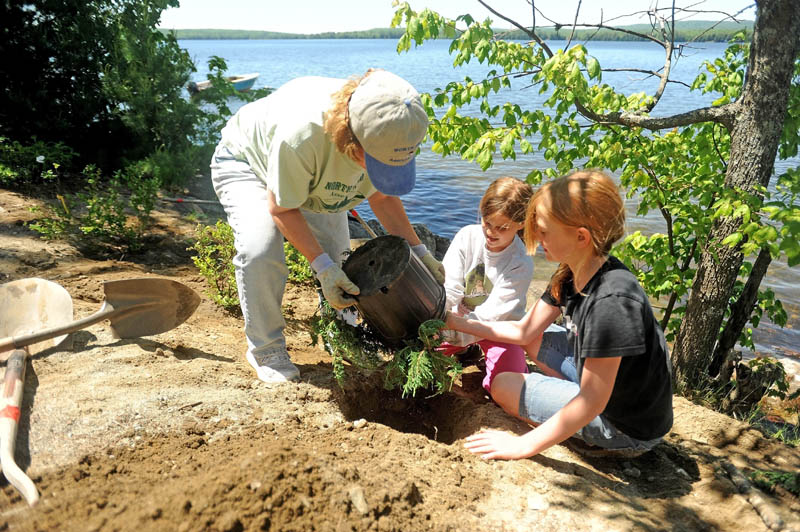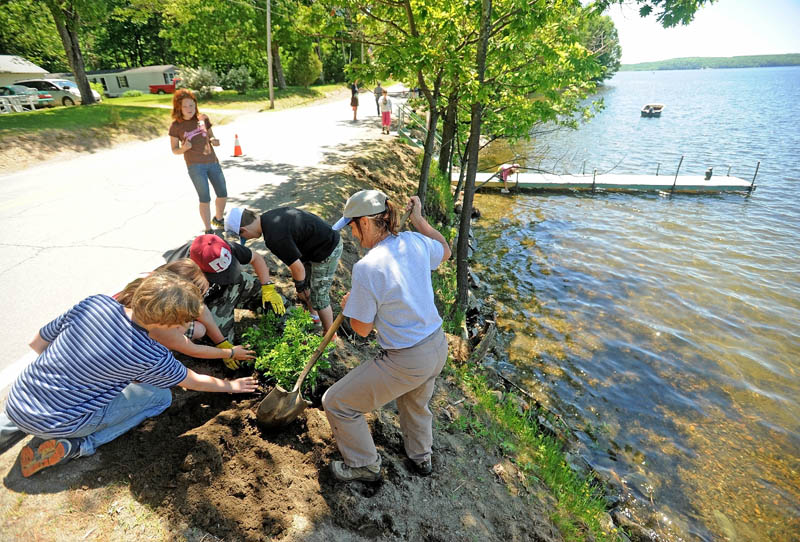SMITHFIELD — Students from Cornville Regional Charter School know erosion is bad for bodies of water, but they recently got to see first hand how it can be prevented.
On Wednesday afternoon, a group of fifth and sixth grade students from the school planted native plants along an embankment of North Pond as part of a project funded by the state Department of Environmental Protection.
The project was also sponsored by the North Pond Association Are You Buff Enough? campaign, designed to coincide with LakeSmart, a state sponsored program that encourages lake health around Maine.
Jodie Mosher-Towle, who is both a board member of the North Pond Association and on the board of the charter school, said the campaign as well as Wednesday’s project are intended to raise awareness about keeping the lake healthy.
“Our goal is to encourage people to take baby steps towards caring for the lake. With this project people can see how easy it is to plant a few plants,” she said.
Blueberries, crawling juniper and blue stem grass were among the native species planted by the students Wednesday.
“When these plants are spread out they act as a sort of buffer preventing soil erosion,” said Leslie Latt, who works in the lake section of the Department of Environmental Protection. She also oversees the Watershed Protection Grant Program, which provided the funding for the project.
Latt said that soil is the number one pollutant of Maine lakes, but that creating a buffer of plants along shorelines can help prevent pollution of the water. Soil contains phosphorus, a common ingredient in fertilizer and road salt that is also found naturally in animal waste, but that can cause harm to water ecosystems, said Latt.
Phosphorus does nothing to harm plants but in water it can cause algae blooms, which turn the water green and can smell bad, she said. It also uses up oxygen in the water which in turn can kill fish and other animals, she said.
Plants that have long roots prevent runoff from entering the lake, said Latt, who also recommends planting native species.
Mosher-Towle said erosion is an ongoing problem at North Pond, where many properties and parts of the road are close to the water, making it easy for salt and dirt to get into the lake. And while LakeSmart is a state-wide program that encourages property owners to be good stewards of lake health, the Are You Buff Enough? campaign is more of a grassroots movement to encourage people to do small things for the lake.
Don Bushnell, 63, who owns the land where the buffer plants were put in place on Wednesday, said he has used the LakeSmart program to plant lilies, blueberries and sedum around his water-front property. He’s also used them in trenches to collect runoff water from his roof.
Bushnell, who lives in Connecticut with his wife, Lynn, said they plan to retire at the lake, where they kayak, canoe and swim.
“Doing this is about keeping the lake healthy,” he said.
“If we want the lake to be healthy for generations, we need to each do a little bit,” said Mosher-Towle.
Rachel Ohm — 612-2368
rohm@mainetoday.com
Copy the Story Link
Send questions/comments to the editors.





Success. Please wait for the page to reload. If the page does not reload within 5 seconds, please refresh the page.
Enter your email and password to access comments.
Hi, to comment on stories you must . This profile is in addition to your subscription and website login.
Already have a commenting profile? .
Invalid username/password.
Please check your email to confirm and complete your registration.
Only subscribers are eligible to post comments. Please subscribe or login first for digital access. Here’s why.
Use the form below to reset your password. When you've submitted your account email, we will send an email with a reset code.